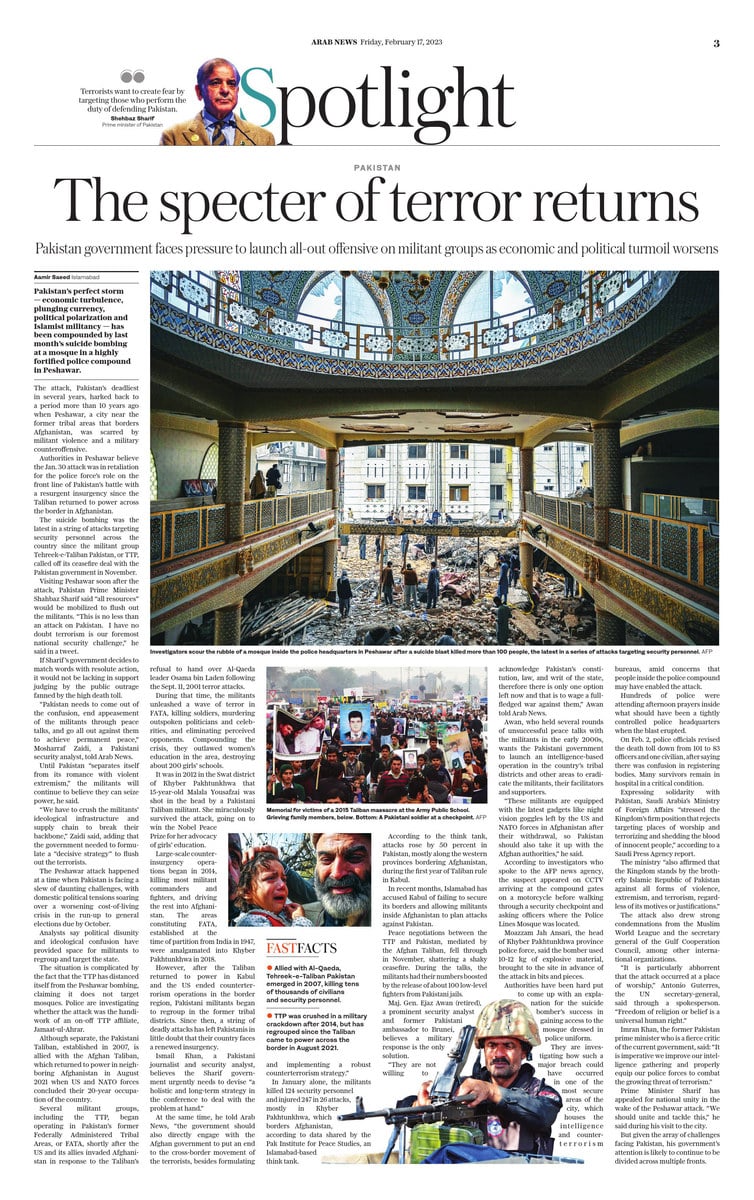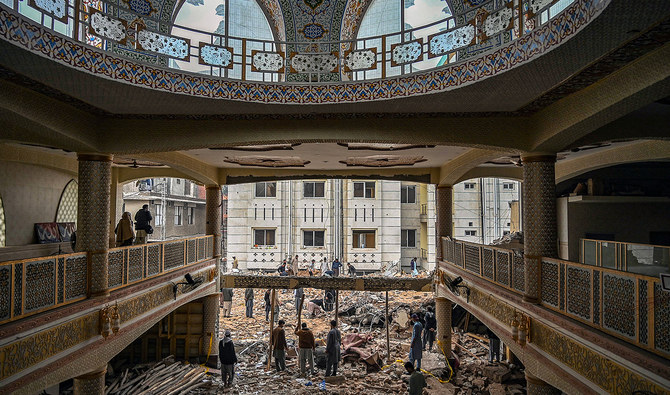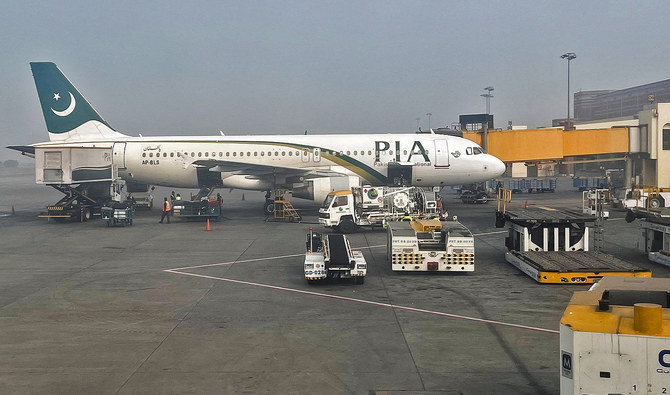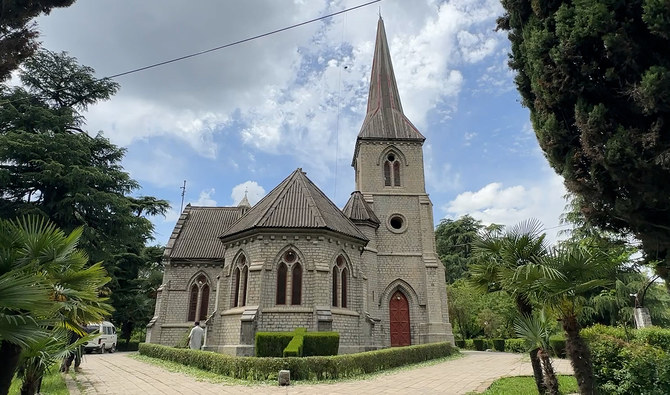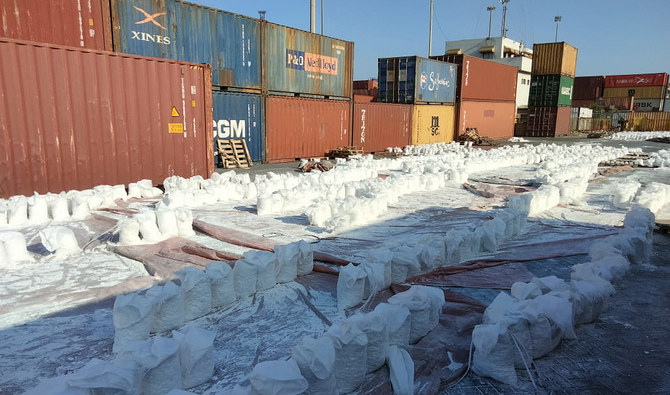ISLAMABAD: Pakistan’s perfect storm of crisis — economic turbulence, plunging currency, political polarization and Islamist militancy — has been compounded by last month’s suicide bombing at a mosque in a highly fortified police compound in Peshawar.
The attack — Pakistan’s deadliest in several years — harked back to a period more than 10 years ago when Peshawar, a city near the former tribal areas that borders Afghanistan, was scarred by militant violence and a military counteroffensive.
Authorities in Peshawar believe the Jan. 30 attack was in retaliation for the police force’s role on the front line of Pakistan’s battle with a resurgent insurgency since the Taliban returned to power across the border in Afghanistan.
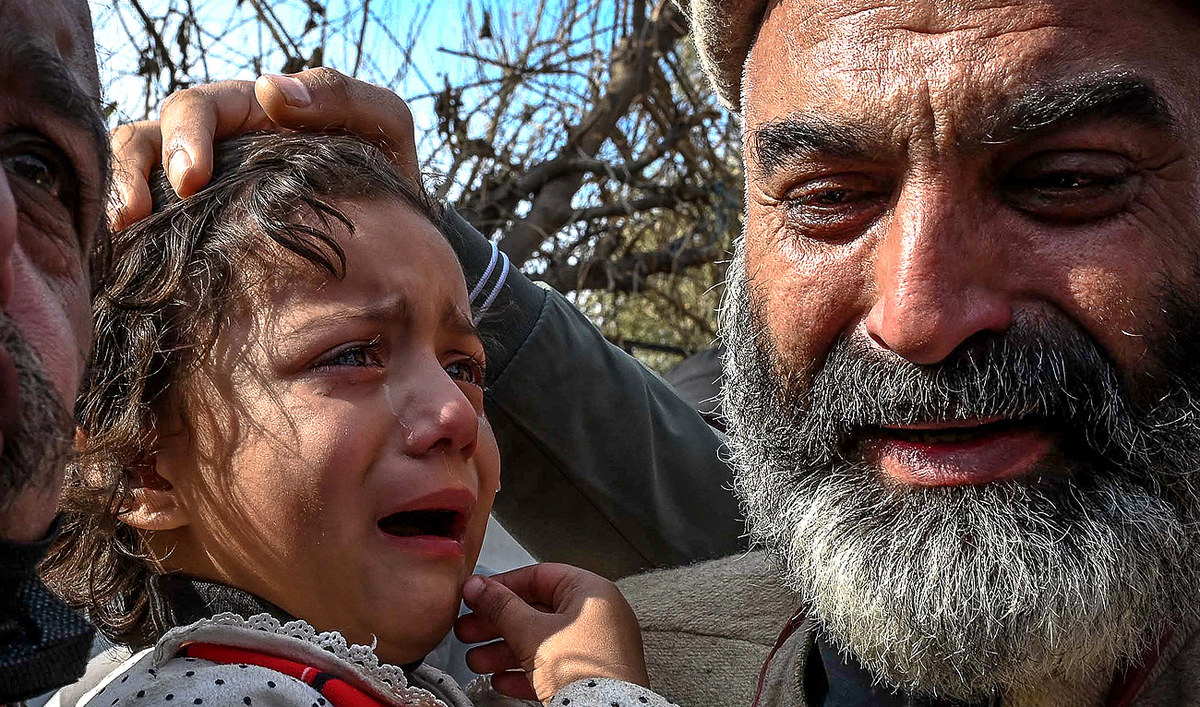
Family members of a mosque blast victim weep during a protest against the militancy and the suicide blast inside a police headquarters in Peshawar on February 1, 2023. (Photo courtesy: AFP)
The suicide bombing was the latest in a string of attacks targeted at security personnel across the country since the militant group Tehreek-e-Taliban Pakistan, or TTP, called off its cease-fire deal with the Pakistan government in November.
Visiting Peshawar soon after the attack, Pakistan Prime Minister Shahbaz Sharif said “all resources” would be mobilized to flush out the militants. “This is no less than an attack on Pakistan ... I have no doubt terrorism is our foremost national security challenge,” he said in a tweet.
If Sharif’s government decides to match words with resolute action, it would not be lacking in support judging by the public outrage fanned by the high death toll.
“Pakistan needs to come out of the confusion, end appeasement of the militants through peace talks, and go all out against them to achieve permanent peace,” Mosharraf Zaidi, a Pakistani security analyst, told Arab News.
Until Pakistan “separates itself from its romance with violent extremism,” the militants will continue to believe they can seize power, he said.
“We have to crush the militants’ ideological infrastructure and supply chain to break their backbone,” Zaidi said, adding that the government needed to formulate a “decisive strategy” to flush out the terrorists.
The Peshawar attack happened at a time when Pakistan is facing a slew of daunting challenges, with domestic political tensions soaring over a worsening cost-of-living crisis in the run-up to general elections due by October.
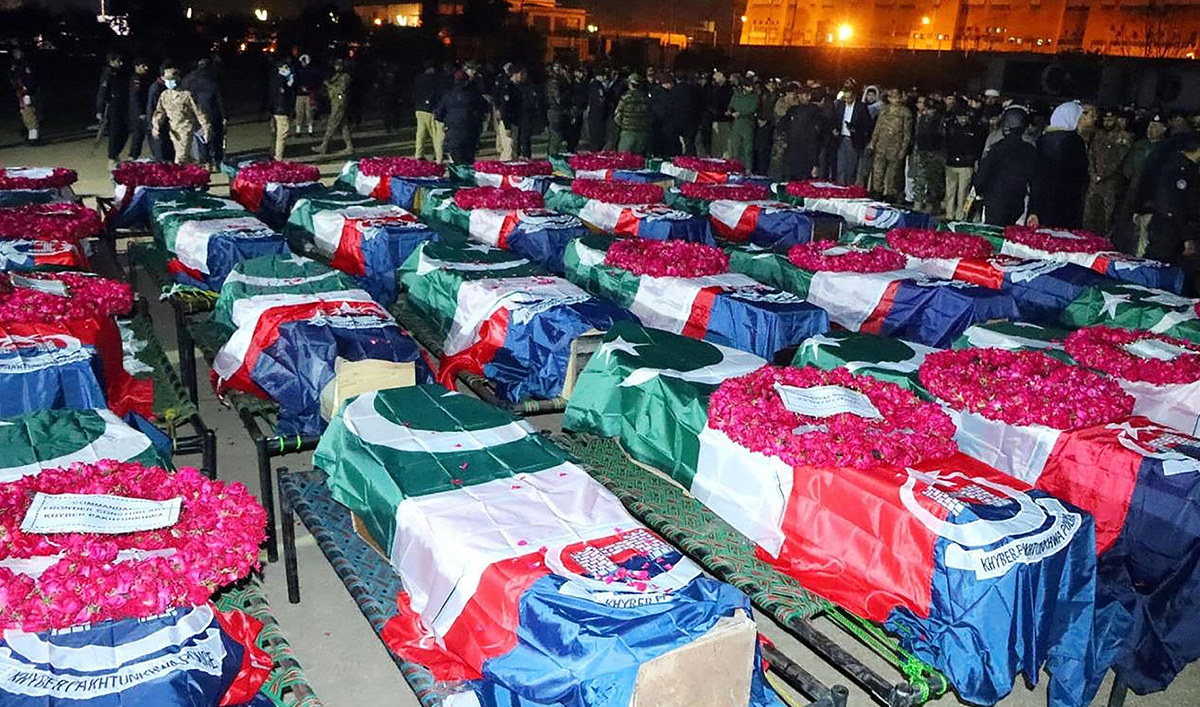
This handout picture taken on January 30, 2023 and released by Pakistan's Police Department shows Pakistan's security officials gather to attend funeral prayers for police officers who were killed in a mosque blast inside the police headquarters in Peshawar. (Photo courtesy: AFP)
Analysts say political disunity and ideological confusion have provided space for militants to regroup and target the state.
The situation is complicated by the fact that the TTP has distanced itself from the Peshawar bombing, claiming it does not target mosques. Police are investigating whether the attack was the handiwork of an on-off TTP affiliate, Jamaat-ul-Ahrar.
Although separate, the Pakistani Taliban, established in 2007, is allied with the Afghan Taliban, which returned to power in neighboring Afghanistan in August 2021 when US and NATO forces concluded their 20-year occupation of the country.
Several militant groups, including the TTP, began operating in Pakistan’s former Federally Administered Tribal Areas, or FATA, shortly after the US and its allies invaded Afghanistan in response to the Taliban’s refusal to hand over Al-Qaeda leader Osama bin Laden following the Sept. 11, 2001 terror attacks.
During that time, the militants unleashed a wave of terror in FATA, killing soldiers, murdering outspoken politicians and celebrities, and eliminating perceived opponents. Compounding the crisis, they outlawed women’s education in the area, destroying about 200 girls’ schools.
It was in 2012 in the Swat district of Khyber Pakhtunkhwa that 15-year-old Malala Yousafzai was shot in the head by a Pakistani Taliban militant. She miraculously survived the attack, going on to win the Nobel Peace Prize for her advocacy of girls’ education.
FASTFACT
Allied with Al-Qaeda, Tehreek-e-Taliban Pakistan emerged in 2007, killing tens of thousands of civilians and security personnel.
Crushed in a military crackdown after 2014, TTP has regrouped since the Taliban came to power across the border in August 2021.
For the Jan. 30 Peshawar blast, Pakistani police have blamed Jamaat-ul-Ahrar, a more radical group occasionally affiliated to the TTP, which has denied involvement.
Large-scale counterinsurgency operations began in 2014, killing most militant commanders and fighters and driving the rest into Afghanistan. The areas constituting FATA, established at the time of partition from India in 1947, were amalgamated into Khyber Pakhtunkhwa in 2018.
However, after the Taliban returned to power in Kabul and the US ended counterterrorism operations in the border region, Pakistani militants began to regroup in the former tribal districts. Since then, a rash of deadly attacks have left Pakistanis in little doubt that their country faces a renewed insurgency.
Ismail Khan, a Pakistani journalist and security analyst, believes the Sharif government urgently needs to devise “a holistic and long-term strategy in the conference to deal with the problem at hand.”
At the same time, he told Arab News, “the government should also directly engage with the Afghan government to put an end to the cross-border movement of the terrorists, besides formulating and implementing a robust counterterrorism strategy.”
In January alone, the militants killed 124 security personnel and injured 247 in 26 separate attacks, the majority of them in Khyber Pakhtunkhwa, which borders Afghanistan, according to data shared by the Pak Institute for Peace Studies, an Islamabad-based think tank.
The breakdown of the data shows that of these 26 attacks, seven took place in Balochistan, in which six people were killed and 17 were injured; one in Sindh with no casualties; two in Punjab, killing two; and 16 in Khyber Pakhtunkhwa, killing 116 and injuring 230.
According to the think tank, attacks rose by 50 percent in Pakistan, mostly along the western provinces bordering Afghanistan, during the first year of Taliban rule in Kabul.
In recent months, Islamabad has accused Kabul of failing to secure its borders and allowing militants inside Afghanistan to plan attacks against Pakistan.
Peace negotiations between the TTP and Pakistan, mediated by the Afghan Taliban, fell through in November, shattering a shaky cease-fire. During the talks, the militants had their numbers boosted by the release of about 100 low-level fighters from Pakistani jails.
Major General Ejaz Awan (retired), a prominent security analyst and former Pakistani ambassador to Brunei, believes a military response is the only solution to the terror threat.
“They are not willing to acknowledge Pakistan’s constitution, law, and writ of the state, therefore there is only one option left now and that is to wage a full-fledged war against them,” Awan told Arab News.
Awan, who held several rounds of unsuccessful peace talks with the militants in the early 2000s, wants the Pakistani government to launch an intelligence-based operation in the country’s tribal districts and other areas to eradicate the militants, their facilitators and supporters.
“These militants are equipped with the latest gadgets like night vision goggles left by the US and NATO forces in Afghanistan after their withdrawal, so Pakistan should also take it up with the Afghan authorities,” he said.
According to investigators who spoke to the AFP news agency, the suspect appeared on CCTV arriving at the compound gates on a motorcycle before walking through a security checkpoint and asking officers where the Police Lines Mosque was located.
Moazzam Jah Ansari, the head of Khyber Pakhtunkhwa province police force, said the bomber used 10-12 kg of explosive material, brought to the site in advance of the attack in bits and pieces.
Authorities have been hard put to come up with an explanation for the suicide bomber’s success in gaining access to the mosque dressed in police uniform.
They are investigating how such a major breach could have occurred in one of the most secure areas of the city, which houses the intelligence and counterterrorism bureaus, amid concerns that people inside the police compound may have enabled the attack.
Hundreds of police were attending afternoon prayers inside what should have been a tightly controlled police headquarters when the blast erupted, causing a wall to collapse and crush scores of officers.
On Feb. 2, police officials revised the death toll down from 101 to 83 officers and one civilian, after saying there was confusion in registering bodies. Many survivors remain in hospital in a critical condition.
Expressing solidarity with Pakistan, Saudi Arabia’s Ministry of Foreign Affairs “stressed the Kingdom’s firm position that rejects targeting places of worship and terrorizing and shedding the blood of innocent people,” according to a Saudi Press Agency report.
The ministry “also affirmed that the Kingdom stands by the brotherly Islamic Republic of Pakistan against all forms of violence, extremism, and terrorism, regardless of its motives or justifications.”
The attack also drew strong condemnations from the Muslim World League and the secretary general of the Gulf Cooperation Council, among other international organizations.
“It is particularly abhorrent that the attack occurred at a place of worship,” Antonio Guterres, the UN secretary-general, said through a spokesperson. “Freedom of religion or belief, including the ability to worship in peace and security, is a universal human right.”
Imran Khan, the former Pakistan prime minister who is a fierce critic of the current government, said: “It is imperative we improve our intelligence gathering and properly equip our police forces to combat the growing threat of terrorism.”
Prime Minister Sharif has appealed for national unity in the wake of the Peshawar attack. “We should unite and tackle this,” he said on Feb. 3 during his visit to the city.
But given the array of challenges facing Pakistan, his government’s attention is likely to continue to be divided across multiple fronts.
